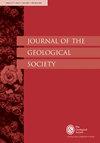3D fault model and seismotectonics indicate the potential seismic risk in the Daliang Mountains, southeastern Tibetan Plateau
IF 3
3区 地球科学
Q2 GEOSCIENCES, MULTIDISCIPLINARY
引用次数: 0
Abstract
Area of active tectonics hosts many active faults and frequently experiences moderate to large earthquakes. The possibility of devastating earthquakes makes the development of major infrastructure projects in these areas risky. World-class large-scale step hydroelectric projects were built along the Jinsha River, such as the Xiangjiaba, Xiluodu, Baihetan, and Wudongde reservoirs in the Daliang Mountains of the southeastern Tibetan Plateau. Using the SKUA-GoCAD modeling platform, we created a thorough three-dimensional (3D) model of the active faults. Regional geological information, historical strong earthquake catalogs, small earthquakes with fine displacement, and 3D seismic tomography are all integrated in this model. The Mabian-Yanjin fault belt consists of a number of discontinuous faults that are either exposed on the surface or concealed, according to the 3D fault model. Some destructive earthquakes, including two enormous M 7 and many moderate earthquakes, have occurred along this fault belt. Some pre-existing thrust faults, together with numerous immature faults in specific areas, may have been reactivated and changed into strike-slip faults. The Jinsha River basin's seismic and geological concerns must be carefully considered given the existence of such intricate fault networks and seismic activity. Supplementary material: https://doi.org/10.6084/m9.figshare.c.6949201三维断层模型和地震构造显示青藏高原东南部大凉山潜在的地震风险
活跃构造地区有许多活跃断层,经常发生中到大地震。由于可能发生破坏性地震,在这些地区开发大型基础设施项目风险很大。世界级的大型阶梯水电工程沿金沙江而建,如青藏高原东南部大凉山地区的向家坝水库、溪洛渡水库、白鹤滩水库和乌东德水库。利用 SKUA-GoCAD 建模平台,我们创建了活动断层的完整三维(3D)模型。该模型集成了区域地质信息、历史强震目录、具有微小位移的小地震以及三维地震层析成像。根据三维断层模型,马边-延津断层带由许多不连续的断层组成,这些断层有的暴露在地表,有的被隐藏起来。该断层带曾发生过一些破坏性地震,包括两次 M7 级大地震和多次中度地震。一些原有的推断断层以及特定区域的大量未成熟断层可能已被重新激活并转变为走向滑动断层。鉴于存在如此错综复杂的断层网和地震活动,必须认真考虑金沙江流域的地震和地质问题。 补充材料:https://doi.org/10.6084/m9.figshare.c.6949201
本文章由计算机程序翻译,如有差异,请以英文原文为准。
求助全文
约1分钟内获得全文
求助全文
来源期刊

Journal of the Geological Society
地学-地球科学综合
CiteScore
6.00
自引率
3.70%
发文量
68
审稿时长
6-12 weeks
期刊介绍:
Journal of the Geological Society (JGS) is owned and published by the Geological Society of London.
JGS publishes topical, high-quality recent research across the full range of Earth Sciences. Papers are interdisciplinary in nature and emphasize the development of an understanding of fundamental geological processes. Broad interest articles that refer to regional studies, but which extend beyond their geographical context are also welcomed.
Each year JGS presents the ‘JGS Early Career Award'' for papers published in the journal, which rewards the writing of well-written, exciting papers from early career geologists.
The journal publishes research and invited review articles, discussion papers and thematic sets.
 求助内容:
求助内容: 应助结果提醒方式:
应助结果提醒方式:


